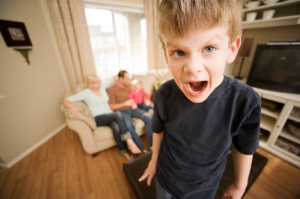Three facts parents should know about social media natives.
By: Marilyn Price-Mitchell, PhD
 Most American teenagers have used some form of social media. And 75% maintain an online social profile, mostly through Facebook. A recent research study, Social Media, Social Life: How Teens View Their Digital Lives, provides fascinating insight into the digital habits of today’s 13-17 year-olds and how social media makes them feel about themselves.
Most American teenagers have used some form of social media. And 75% maintain an online social profile, mostly through Facebook. A recent research study, Social Media, Social Life: How Teens View Their Digital Lives, provides fascinating insight into the digital habits of today’s 13-17 year-olds and how social media makes them feel about themselves.
When asked how social media affected their emotional well-being, teens overwhelmingly reported positive outcomes. They were far more likely to say they felt more confident, less depressed, more outgoing, more popular, less shy, and more sympathetic to others because of their online interactions. However, for about 5% of young people, the results were more negative.
The majority of teens (52%) say that social media has improved their relationships with friends while only 4% say that friendships have been harmed. Similarly, many more report that social media has helped relationships with family members (37%) rather than hurt them (2%).
From the 40-page study, three findings stood out that will be particularly pertinent to parents of social media natives..
1. Face-to-Face Communication Ranks High
Contrary to fears that digital communications will turn young people into robotic creatures unable to relate intelligently in the real world, most teenagers prefer face-to-face interactions. This finding supports my own research study on civically-engaged youth. While the teens in my study were highly active in the online world, they admitted their greatest learning and enjoyment came from face-to-face relationships.
The reason we observe so many young people texting is because 68% of them do so on a daily basis! Next to face-to-face interactions, texting is king. Why? Teens say It’s quick, easy, and gives them the opportunity to think before responding.
Because they value face-to-face relationships, many agreed that social media takes time away from being with people in-person, which they often perceive as a dilemma.
2. Teens Sometimes Want to Unplug
Like adults, teens often feel the need to unplug from their digital lives. One young person said, “Sometimes it’s nice to just sit back and relax with no way possible to communicate with anyone.”
When asked if they felt “addicted” to their cell phones, 41% answered “Yes.” And they also pointed out that parents were addicted to gadgets too. In fact, many wished parents would spend less time on their devices and felt frustrated when people surfed the internet, checked email, or texted while they are hanging out together.
3. Social Networking Begins Early
Facebook is by far the most favorite social networking experience for teens. Three-quarters of 13 to 14-year-olds frequent social networking sites, and that goes up to 87% by the time they reach 15 to 17 years of age.
While most teens say they understand Facebook privacy policies, many do not. Before your teen posts a profile, this is one of the most important things to help them review and understand. Young people must recognize that their digital profiles will follow them for the rest of their lives.
Among teens with an online social profile, there are three reasons why they enjoy and benefit from social networking. 1) It helps them keep in closer touch with friends, particularly the ones they don’t see regularly, 2) They become more deeply acquainted with students at their own schools, and 3) They are able to connect with people with whom they share common interests.
Should Parents Worry?
Many parents worry that Facebook and other social networking sites will bring emotional harm to their children, either from predators, cyber-bullying, or inconsiderate friends. But the majority of teens don’t believe these sites affect them emotionally, one way or the other.
For young people who do report a change in psychological health, only a small percentage reported a negative change. In fact, emotional well-being was not discernibly different if a teen was a heavy or light social networker.
One troublesome result of this study is how often teens encounter online hate speech. This includes language that is sexist, homophobic, racist, or derogatory in other ways. Forty percent of teens report this to be a common element of online dialogue. It’s a good idea for parents to prepare teens for this and teach them how to respond. Check out the article, Teaching Civility in an F-Word Society, for some guidance.
This study, while limited in scope, can give parents some peace of mind. While cyber-bullying is real and some young people are genuinely harmed by their online relationships, these situations are the exception, not the rule. We should set rules and give children guidelines for online behavior just as we do for behavior in the real world.
The bottom line: Take a deep breath and be grateful for the fact that most teens using social media and digital devices report an overall sense of happiness and confidence. And despite the fact that their lives are intertwined with technology for evermore, they mostly appreciate the face-to-face time they spend with their friends and family. Let’s hope that never changes!
Source: http://www.psychologytoday.com/blog/the-moment-youth/201207/inside-the-digital-lives-teens



